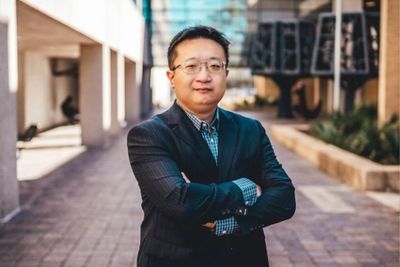zeroing in on zero emissions
Houston researcher scores $500,000 award to continue on work on energy transition

UH's Jian Shi recently received the NSF's CAREER award, which will dole out $500,861 in funding through February 2029. Photo via UH.edu
A University of Houston professor and researcher is laser focused on his work within the energy transition, and National Science Foundation has taken note, awarding him over half a million dollars in funding.
Jian Shi, an assistant professor within the Cullen College of Engineering, recently received the NSF's CAREER award, which will dole out $500,861 in funding through February 2029.
The award was granted for his research, entitled “A Unified Zero-Carbon-Driven Design Framework for Accelerating Power Grid Deep Decarbonization.”
“One of the most major challenges inherent in energy transition is the cost. While reducing carbon emissions serves the best interest of society in the long run, the short-term financial burdens also need to be carefully evaluated to ensure that we have a safe, affordable, reliable and just transition for all,” Shi says in a UH news release. “This challenge has inspired me to work on the innovative framework of “ZERO-Accelerator.”
Shi's ZERO-Accelerator is focused on taking standard carbon-driven tools and integrating them into current power grid operational practices. Shi is the director and founder of SOAR, or the Smart and ZerO-Carbon Energy Analytics and Research Lab.
“It synthesizes interactions from multiple key stakeholders involved in the electricity ecosystem,” says Shi. “The framework considers how to manage carbon allowance allocation and trading for electricity producers, how to maintain a 24/7 zero-carbon power grid for power grid operators and how to enable consumers to understand their carbon footprint and participate in the zero-carbon grid operation.”
In his CAREER proposal, Shi explains that he is also contributing to training the future energy workforce. He adds that he shares this award with his colleagues.
“I believe no accomplishment is truly individual,” he says. “Rather, it is a collective triumph achieved through collaboration, support and shared dedication. As I reflect on the milestones I've reached, I am compelled to express my deepest gratitude to my esteemed colleagues whose unwavering commitment has been instrumental in not just my collective success, but our collective success as well."
Last summer, Shi mentored a UH team in the inaugural American-Made Carbon Management Collegiate Competition, hosted by the U.S. Department of Energy's Office of Fossil Energy and Carbon Management. The team, GreenHouston, took third place in the competition, securing a $5,000 cash prize.